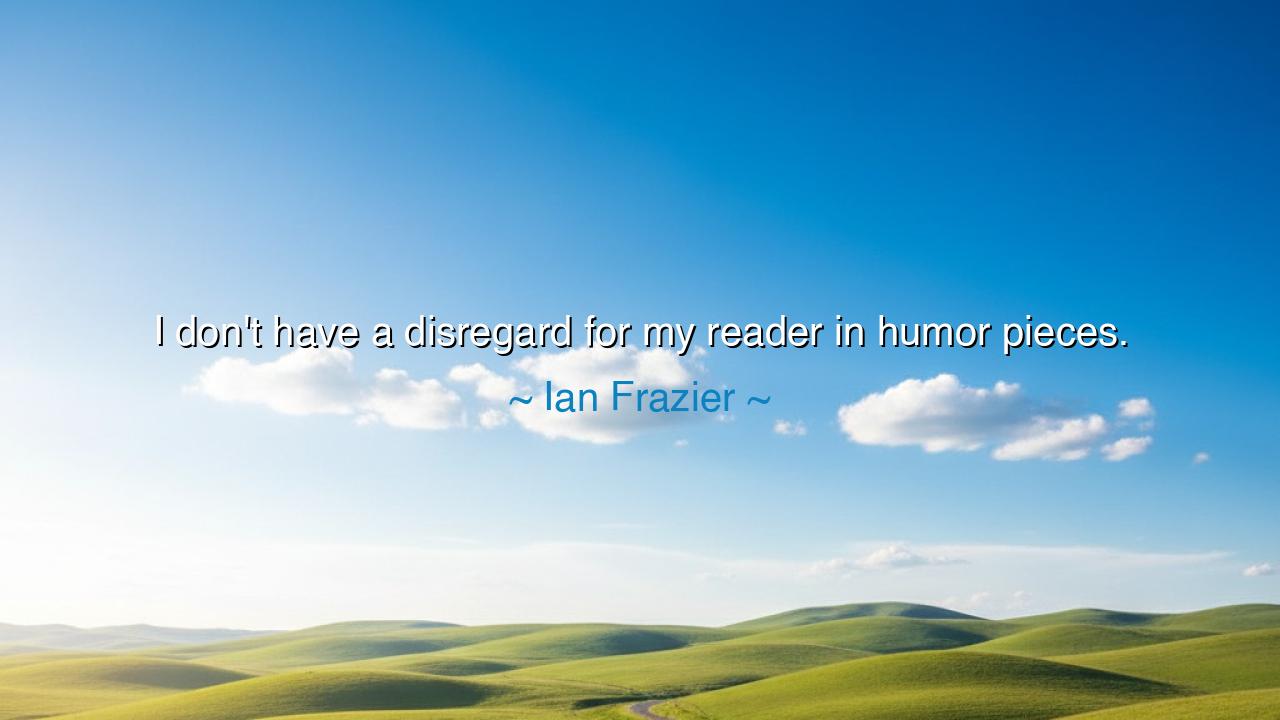
I don't have a disregard for my reader in humor pieces.






When Ian Frazier said, “I don’t have a disregard for my reader in humor pieces,” he was not merely describing a style of writing — he was expressing a philosophy of respect, empathy, and human connection. His words carry the tone of an artist who understands that humor, like truth, is sacred ground. In this simple statement, Frazier reveals that the writer’s first duty is not to his own cleverness, nor to the easy laughter of the crowd, but to the dignity of his reader. The humorist, he implies, must never forget that laughter is a fragile bond — one that can unite or wound, elevate or diminish. To disregard one’s audience is to break that bond, to turn laughter into arrogance, and to lose the human heart at the center of all art.
The meaning of this quote lies in the writer’s reverence for his audience. Frazier reminds us that humor is not a weapon to be wielded recklessly, but a light to be shared carefully. When a writer mocks or sneers, when he uses laughter to humiliate rather than to heal, he betrays the sacred exchange between storyteller and listener. But when humor is written with regard — with compassion, intelligence, and humility — it becomes transformative. It reveals the absurdities of life not to condemn humanity, but to forgive it. True humor, Frazier teaches, is not born from cruelty, but from understanding — the ability to laugh at our shared weaknesses while still believing in our shared worth.
The origin of this wisdom can be traced back to the long tradition of humor as moral art. In the ancient world, the Greek playwright Aristophanes used laughter not to scorn his audience, but to awaken them. His comedies exposed the follies of his city, yet always with the hope of renewal. Centuries later, the philosopher Cicero wrote that wit must be “used with measure, as a doctor uses his scalpel — to heal, not to harm.” Frazier stands in this lineage of thoughtful humorists, those who understand that laughter is a mirror reflecting truth, and that the writer must never shatter it out of carelessness. His respect for the reader springs from this ancient wisdom: that art, especially comic art, carries both joy and moral responsibility.
To illustrate this truth, consider the example of Mark Twain, the great American humorist. Twain’s laughter was not cruel, though it often cut deep. In works like Huckleberry Finn, his humor exposed hypocrisy, racism, and greed — but never at the expense of human compassion. His jokes invited readers to confront their own flaws, yet he always left them with hope. Twain once said that “the human race has only one really effective weapon, and that is laughter.” But he wielded that weapon with care, for he knew that laughter could destroy or redeem depending on the spirit in which it was used. Like Frazier, Twain respected his reader enough to tell hard truths gently — to provoke thought, not hatred; to enlighten, not to embarrass.
To regard the reader is to remember that art is a form of fellowship. The writer does not stand above his audience, but among them. When humor becomes self-serving — when it mocks rather than embraces, or confuses cruelty for cleverness — it ceases to be art and becomes noise. Frazier’s humility, his awareness of this moral line, is what gives his humor its strength. His readers do not feel mocked or manipulated; they feel seen. They laugh not at others, but at themselves — and in that laughter, they find comfort. This is the essence of empathy in humor: to show people their imperfections without diminishing their humanity.
The ancients knew this as well. The philosopher Plato, though wary of comedy, acknowledged that the laughter that springs from wisdom is noble. For wisdom allows us to see folly without contempt, and to forgive it without blindness. The greatest teachers, prophets, and poets have always known how to laugh kindly — to use humor as a way of easing pain and bridging distance. In every era, the true humorist has been a healer, not a destroyer. And this is what Frazier’s words remind us: that humor must always serve the human spirit, never degrade it.
So, my listener, let this teaching take root in your heart: never disregard those who listen to your voice. Whether you write, speak, or jest, remember that your words carry weight. Approach laughter with the reverence of a craftsman and the compassion of a friend. Ask yourself, before you make another smile — does this laughter build or break? Does it heal, or does it harm? Let your humor arise from understanding, not superiority. For laughter shared in kindness can transform even sorrow into strength.
In the end, Ian Frazier’s message is not only for writers — it is for all who wish to speak truth with grace. Respect your audience. Regard them as fellow travelers on the path of life. Do not mock their pain, but honor it; do not exploit their ignorance, but enlighten it. Use humor to open doors, not to close them. For the laughter that comes from respect is eternal — it echoes in hearts long after the words have faded. And when you make others laugh with love, you do more than entertain them — you ennoble them, and in doing so, you elevate yourself.






AAdministratorAdministrator
Welcome, honored guests. Please leave a comment, we will respond soon